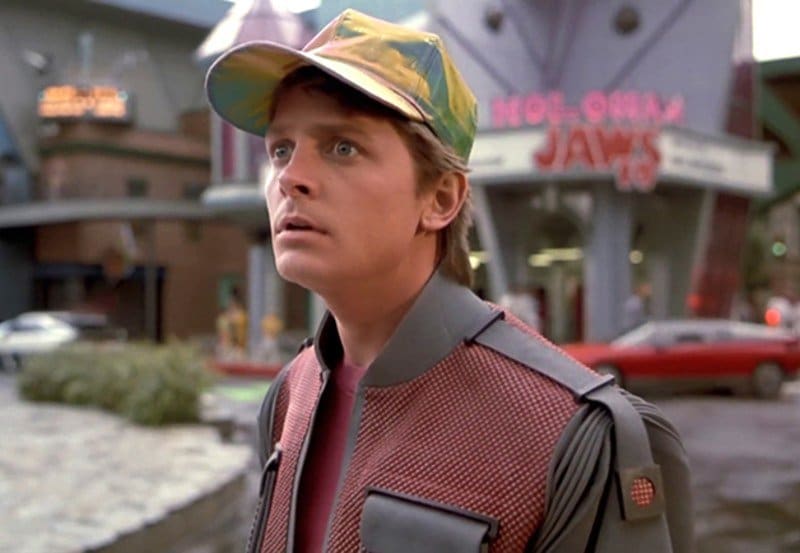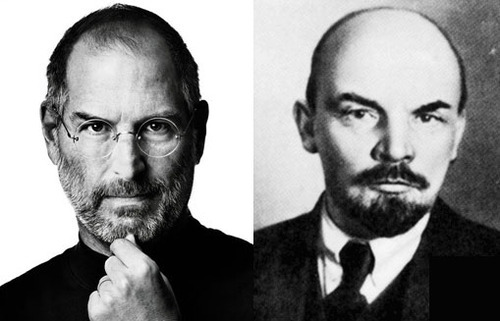OK, so here we are, well into 2010. A well-used date in the science fiction of the mid twentieth century, by which time we would be zipping between space ports, taking one-second ion showers in the morning and generally looking pretty sodding slick. It didn’t turn out quite how we expected, and we’ve seen it coming a long time.
Different versions of the future down the ages have always fascinated me (that’s a whole other blog post). It’s interesting that since the 1980s science fiction has started to be a lot more realistic with its timelines, placing plots 300 or 3,000 years hence, not 30 years ahead as in Back To The Future II which depicted people going about on hover-skateboards and wearing shit baseball caps made out of hologram-foil:

I guess they kinda got that last bit right…
This realism was no doubt due to the space race cooling off and the harsh realisation that space travel is actually quite hard and even getting someone to Mars would be a bit of a ballache. Whilst coming to terms with our unstellar, essentially-medieval-but-cleaner present and future existence we’ve made some truly amazing advances in more useful, mundane technology which allows us to make telephone calls on the move and listen to any music in the world from the comfort of home. There are however some aspects of consumer technology that really need to pull their socks up:
Video connections – should it still be this hard to send and receive moving images with sound, in the same room? We still have no standard, other than HDMI which is still far from universal. The DVI out on my MacBook Pro has to be converted into VGA and I still have to pipe the audio out from my headphone socket into the TV or a hi-fi. Too many cables and hassle. We really should have a wireless, lossless video transmission protocol which is adopted by all TVs, DVD players, computers etc.
ETA: Development is slow and offices the world over seem happy with a VGA cable limply hanging out from a flatscreen TV for those who dare to risk looking like they can’t operate their own laptop. I’m setting the flux capacitor to 2015 on this one.
Internet connectivity – use a laptop? Who doesn’t? And yet it’s still a stroke of luck if you manage to get wifi anywhere. I rely on my jailbroken iPhone and an app that lets me turn it into a wifi hotspot for internet on the move. It seems crazy that modern laptops don’t come with 3G as standard, and that 3G isn’t quite a bit faster.
ETA: The iPad will put the pressure on laptop manufacturers and 3G (or even forthcoming 4G) will become standard in 2012
File-sharing – use a shared drive at work? Crap, isn’t it? Ideally we should all be working in ‘the cloud’, perhaps on Google, though even Google Docs is a tad hokey. It really feels that by now we should have full Microsoft Office-level publishing software that allows seamless collaboration and publication.
ETA: Feels close, with the likes of Dropbox and Google, not to mention Microsoft Office Live, I expect us all to be working nebulously by next year.
Mobile internet – thank the Lord for the iPhone. Without Apple’s groundbreaking dog-and-bone we’d still be struggling with mashed up, half-loaded webpages on screens the size of postage stamps. But it feels we’re still a long way off the dream of mobile internet access being anything other than a crippled ‘lite’ version of the real www. And then there’s document management. We need to be able to make PowerPoint presentations, images and webpages on the move. Maybe the iPad will resolve this but it remains to be seen how portable we’ll feel Jobs’ latest creation to be.
ETA: Another job for iPad. Expect mobile devices and networks to step up their game this year. We could be living the dream of a full web experience on mobile by next summer.
Media-sharing – remember when Bluetooth came out? Suddenly the future of effortlessly swooshing files between devices wherever you were started to look like a reality. Not quite… it’s slow and still not universal. And the marriage of TV and internet has hardly been idyllic. We all access an increasing amount of music and video online and yet we will always, even in 2510, want to just sit back from time to time with a box of Tunnocks teacakes and a cup of Lady Grey on a welcoming, tattered sofa and just watch. No interactivity, no options, certainly no plugging in DVI cables, audio cables, transferring files to/from games consoles etc. Apple TV was supposed to address this but has too many restrictions and is far from widely adopted. Recent Boxee integration might help.
ETA: Getting better, and with an increasing amount of new TVs coming with net connections this could be two or three years away.
Video game purchases – most home connections can download 3GB in an hour (if from a fast server). I guarantee that on average people spend longer than that travelling to and from physical retail stores to obtain video games in plastic boxes. It’s frankly madness that I can’t just buy and download any game through the Playstation Store or Xbox Live. If anyone can explain the business sense of this to me please do in the comments below.
ETA: Plastic boxes will start to die out in the next 12 months. Expect digital game releases to dominate by Christmas 2011. This is admittedly optimism on my part!
In writing this I’ve been pondering why these gaps (and others, please discuss them in the comments) even exist. I think a large part of it is the lack of standardisation. In some ways standardisation isn’t good for the tech industry as it often relates to monopolisation and the lack of competition can leave development stagnating. It can however be great for the consumer as advances in functionality and usability can be concentrated on widely adopted products and formats instead of spread thinly amongst millions of them. An example of this could be on the horizon in the form of the proposed universal mobile phone charger which some major mobile manufacturers have agreed to conform to. As well as making consumers’ life a lot easier this initiative will inevitably cut down on waste, which is another great reason for widespread standardisation.
I guess it’s a delicate balance to strike between a free marketplace that fosters innovation and one which provides individuals what they need to innovate but in controlled parameters. A bit like liberals vs socialists then. Which makes me a technology commy. Does that make Steve Jobs the tech equivalent of Lenin? He’s certainly getting the look.

Want to learn new creative and marketing skills with me? Check out upcoming courses on topics like SEO, content marketing, copywriting and podcasting.
What's trending in digital marketing?
Stay on top of the latest news, tips, tools and updates in digital. Just for people in marketing and business. No fluff, no ads, no spam.
Join thousands of readers keeping abreast with it all, every Thursday.

















